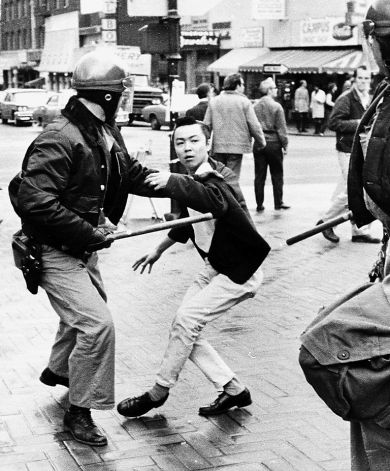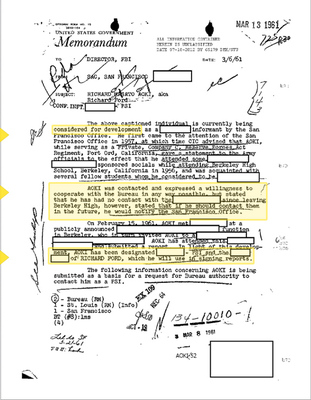
Snitch-Jacketing Aoki
On August 20, 2012 an article was released alleging that Richard Aoki, a Japanese national and early Black Panther Party (BPP) member, was an FBI informant. This claim was made by journalist and author Seth Rosenfeld, whose book Subversives: The FBI’s War on Student Radicals, and Reagan’s Rise to Power was conveniently released on August 21. On September 7, 2012 Rosenfeld published a follow-up article, with 221 pages of “newly released” FBI documents which he believes further implicate Aoki as an FBI informant.(1)
Let’s start with Rosenfeld’s political worldview, because we know no journalist is truly unbiased. Rosenfeld’s opinion on liberation struggles is revealed in his characterization of the Third World Liberation Front (TWLF), that Aoki organized in, as a violent student movement.(2) He blames the violence of the 1968-69 strikes of the TWLF on Bay Area college campuses on the strikers themselves, not the pigs. Yet the students did not initiate violence, and in fact were sprayed with so much teargas by the pigs that the trees in Sproul Plaza on the University of California at Berkeley campus were still irritating students’ eyes even into the following school year. Coming from this perspective we must question Rosenfeld’s assessment of the FBI right off the bat.

Influencing the Party greatly from its beginning, Richard Aoki is most famous for supplying the BPP with their first guns. According to his biography, Aoki helped shape the early ideology of the Panthers through his relationship with Bobby Seale and Huey Newton at Merritt College by suggesting reading material and engaging with them in political debate.(3) Besides his work with the BPP, Richard Aoki also did much organizing and protest work with the Third World Liberation Front via the Asian American Political Alliance. Aoki remained politically active and revolutionary-minded even until his death in 2009. Surprisingly, Rosenfeld is from San Francisco and has been doing research for this book since 1982, yet it wasn’t until 2002 or 2003 that he learned of Richard Aoki.
Understandably, Rosenfeld’s claim has sparked a lot of debate on the internet and radio as to whether it is true or not. While we are open to the possibility of nearly anyone being an agent of the state, MIM(Prisons) agrees with those who have held out for clear proof before we will consider denouncing Aoki’s legacy of the state. Objectively, the current evidence supporting this claim is inconclusive at best. The original article was highly sensational, focusing on vague, chopped up, and misquoted sound-bites of a 2007 interview with Aoki that the author interprets as admissions of guilt. Besides these sound-bites, the only other evidence offered are ambiguous FBI documents, citing Aoki as providing “unique” information not available from any other source, and the testimony of former FBI agents, of whom the only one that supposedly knew Aoki is also dead.(4) Yet none of the documents say what information Aoki supposedly gave the FBI; it has all been redacted.
On the radio program APEX Express, Harvey Dong, a close friend of Richard Aoki, offered the listener a thorough reading of the relevant parts of the FBI documents cited by Rosenfeld (as well as excerpts from Aoki’s college term papers).(2) The only information which allegedly came from Aoki in the first set of FBI documents is about Aoki himself and could have been obtained using a wiretap (or informant) on Aoki. Assuming the released FBI documents are real, the set released on September 7 does establish that Aoki was giving information to the FBI from 1961 to 1977, but very little about that relationship is revealed.

documenting his role
as an informant for the Bureau.
The fact that the FBI redacts all names of individuals and organizations that Aoki allegedly provided information on makes it impossible to speculate on the nature of his interactions with the Bureau. Rosenfeld’s follow-up article pulls many quotes from the 221 pages of documents indicating that Aoki provided valuable information, but any details that might substantiate these statements are redacted or absent. Despite this release of new documents, there is still no information on what intelligence he allegedly gave to the FBI on the BPP or other groups. While we should always be prepared for the possibility that a trusted comrade is an agent, we need to see evidence of harm done to the movement to condemn someone who did so much to advance the cause.
It is very conceivable that the FBI is snitch-jacketing Aoki to discredit his work as a Third Worldist revolutionary activist, discredit the Panthers as pawns of the FBI, and more simply to sell copies of Rosenthal’s new book. One of the lessons we learned from the Panthers, and other political movements of the 1960s, is the importance of security. The COINTELPRO attacks on the Panthers led MIM to develop as a semi-underground organization that keeps comrades at arm’s length, centering around political, rather than persynal, relationships.
Interestingly, on 20 August the FBI had yet to release about 4,000 pages of documents on Richard Aoki, and was claiming to have no main file on Aoki himself. This cannot be true considering how politically active and outspoken he was. Rosenfeld and others saw the FBI withholding these documents as indicative of Aoki’s status as an informant, assuming these were reports given by Aoki.(4) Then supposedly some time between 20 August and 7 September, the FBI released at least 221 pages of documentation just on Richard Aoki. With all the heated debate, we note that the FBI chose a very opportunistic time to release these documents, which causes us to further question their legitimacy. Why would the FBI release documentation that says Aoki didn’t provide valuable information? This controversy is feeding right into their agenda to undermine revolutionary activists and movements.
The distrust that has evolved surrounding this claim is classic, and a perfect example of why the BPP often quoted Mao by saying, “No investigation, no right to speak.” This Aoki “scandal” should be a reminder of how snitch-jacketing can impact our anti-imperialist movement, and our prison organizing especially. One of the principles of the United Front for Peace in Prisons is UNITY,
“WE strive to unite with those facing the same struggles as us for our common interests. To maintain unity we have to keep an open line of networking and communication, and ensure we address any situation with true facts. This is needed because of how the pigs utilize tactics such as rumors, snitches and fake communications to divide and keep division among the oppressed. The pigs see the end of their control within our unity.”(5)
This is a lesson we’ve unfortunately had to learn time and time again. A claim that everyone on SNY or Protective Custody is a snitch, or a rumor on the yard, is not sufficient evidence to call someone out as an agent of the state. Sometimes comrades suggest that we require USW members to submit their files from the Department of Corrections to determine whether they are compromised in any way based on charges, and where they’ve been housed in the past. They tell us we should ask the state who we should let into USW. Not only is this ridiculous in theory, but we know of at least one case where an informant was given doctored files and released back onto general population to be a Lieutenant in a prominent LO in California. A piece of paper from a government agency should only be considered as one piece of evidence, not the sacrosanct truth.
The state is already putting a lot of energy into making us suspicious of our fellow revolutionaries; we should not make their job any easier. Instead we should be communicating with each other directly if we suspect unprincipled divisions are being fomented. Our struggle is too important to get caught up in rumor mongering and sectarianism.
Even if evidence does eventually come out which proves Aoki was providing the FBI with information that actually helped them attack the liberation struggle, we will still not be devastated. While we don’t agree with Fred Ho’s subjectivist methodology of defending Aoki overall, we do have unity with his perspective on the consequence of truth in the allegation. “If Aoki was an agent, so what? He surely was a piss-poor one because what he contributed to the movement is enormously greater than anything he could have detracted or derailed.”(6) This view is right in line with our view on how to maintain security within the anti-imperialist prison movement; don’t give a pig the opportunity to do more damage than good. Distributing information on a need-to-know basis and applying high standards to different levels of membership will help ensure people contribute more to the cause than to the enemy.







